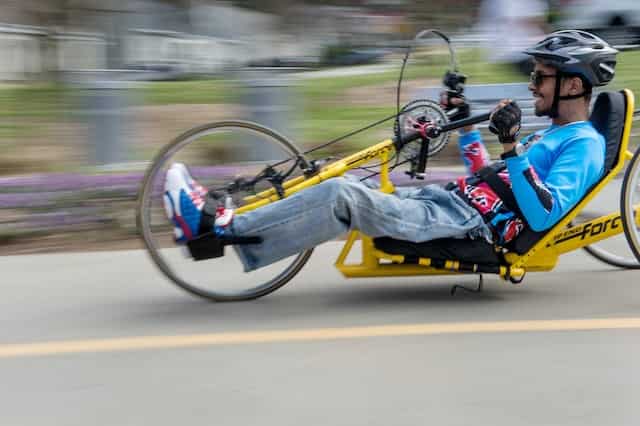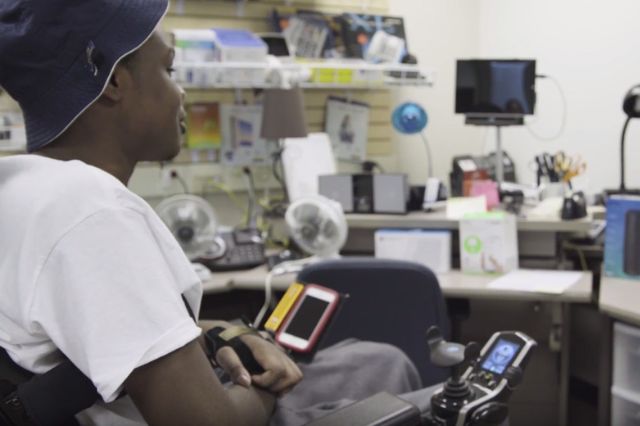Acquired Brain Injury Research
ABI Research Focus
The Acquired Brain Injury (ABI) Research Program at Shepherd Center aims to advance the understanding of brain injury to better treat ABI patients, improve their health and functioning, community participation, and vocational opportunities. Our research encompasses a broad range of disciplines and methodologies, and we collaborate with clinicians and professionals in physiatry, allied health, neuropsychology, social science, and the humanities. Our projects explore and investigate brain function, rehabilitation treatment and services, and life after brain injury that may be categorized as:
- Investigations of brain functioning and processes. Advancing the understanding of neurological processes to develop effective treatments.
- Descriptive studies identifying predictors of outcomes. By working with patients and families, we assess factors that may be determinative of positive outcomes. Our findings help us develop interventions and define rehabilitation goals that may improve patient outcomes.
- Interventions in rehabilitation practice. Through our research studies, we can better determine which interventions improve patient outcomes and then translate our findings into clinical practice.
Current Research Studies
Validation of a Neuropsychological Model of Disorders of the Self
- This study aims to document the relationships that exist among right hemisphere neuropsychological functions, “disorders of the self,” and character traits to determine effective treatments.
- PI: B. Johnstone
- Internally funded
A Longitudinal fMRI Study of Theistic Relational Processing in Individuals with Neurologic Dysfunction
- This study is being conducted to determine how different brain regions and processes are associated with how we experience "relationships," whether with other humans or our conceptualization of the divine.
- PI: B. Johnstone
- Funding Source: Shirley Ryan Ability Lab (John Templeton Foundation)
The “Sense of Self” as a Construct to Unite the Sciences and Religion
- The purpose of this study is to explore how medical factors (disability type and severity) and neurological factors (sense of “self”), religious beliefs, and spiritual interventions interact to influence spirituality, moral behaviors, character traits, and health outcomes in individuals with brain injury.
- PI: B. Johnstone and Co-PI:
- Funding Source: John Templeton Foundation
Evaluating the Effectiveness of Least Restrictive Restraint Training Program for Individuals with ABI
- Many individuals with moderate to severe acquired brain injury (ABI) present continued safety risks (e.g., falls, pulling out medical tubes) when discharged. The ABI team has developed a program to train caregivers on the effective use of restraints to ensure patient safety and health, as well as reduce caregiver burden and stress.
- PI: B. Johnstone
Foundation to Advance Brain Rehabilitation (FABR)
- Shepherd Center has collaborated with five other brain injury rehabilitation organizations to aggregate patient outcome data on the impact of brain injury rehabilitation following acute care.
- PI: B. Johnstone
Documenting the General Effectiveness of Chaplaincy Services for Individuals with Chronic Disabilities
- Chaplaincy services have been shown to help patients and their families address spiritual needs. This study aims to discover more about the general impact on patient health, functioning, financial costs, and services.
- PI: B. Johnstone
- Internally funded
Documenting the General Effectiveness of Recreational Therapy Services for Individuals with Acquired Brain Injury
- Recreational therapy services (e.g., art, music, and animal therapy) help patients and their families improve their health, functioning, and community participation. This study aims to document the benefits for inpatients with acquired brain injury (ABI).
- PI: B. Johnstone
- Internally funded
Social Determinants of Recovery, Health, and Community Participation in Underserved Asian American Rehabilitation Populations
- The study aims to assess and characterize cultural values, beliefs, and subjective experiences which underlie rehabilitation care-related decision-making and to relate these factors to the outcome indicators across different Asian American subgroups.
- PI: B. Johnstone
- Internally funded
Burnalong-ABI
- Shepherd Center is collaborating with the developers of a new platform (i.e., Burnalong; www.Burnalong.com) that offers a broad range of health and wellness content in people’s homes. The purpose of this study is to determine if provision of resources (i.e., free computers/tablets/smart phones, training, internet access) and delivery of interventions through existing (i.e., telehealth) and novel platforms (i.e., Burnalong) can improve outcomes in individuals with acquired brain injury, both English and Spanish-speaking, living in rural areas.
- PI: D. Backus
- Moody Foundation
Meet Our ABI Research Team
Lab Outputs
- Bankard, J., Yoon, D.P., Smith, E.I., Cohen, D., Bruininks, P., Edman, L., Witvliet, C.V.O., & Johnstone, B. (2023). The interaction between forgiveness and resentment on mental health outcomes. Religion, Brain, and Behavior.
- Jones, C., Ramsey, K., Beydoun, H.A., & Johnstone, B. (2023). Neuropsychological Deficit Profiles for Service Members with Mild Traumatic Brain Injury. Brain Injury.
- Cohen, D., & Johnstone, B. (2023). Evolution of the Parietal Lobe in the Formation of an Enhanced "Sense of Self": The Neuropsychological Foundations of Socialization, Spirituality, and Prosocial Behaviors. Journal of Cognition and Culture.
- Slaton, M. R., & Johnstone, B. (2022). Reconciling Mystical Experience with Concept of the Self: The Poetry of an Individual with a Right Temporal Lobectomy. Journal of the Humanities in Rehabilitation.
- Yoon, D. P., Bruininks, P., Smith, E. I., Witvliet, C. V. O., Cohen, D., Edman, L. R. O., Bankard, J., Little, K., & Johnstone, B. (2022). The relationships between positive character traits, virtues, and health. Social Work & Christianity, 49(2), 135-163. DOI https://doi.org/10.34043/swc.v49i2.188
- Lesniak, E., Ramsey, K.G., Brady, C., Heydoun, H.A., & Johnstone, B. (2022). Predicting Military Readiness Using Objective and Subjective Indices of Neuropsychological Impairment in Service Members with Mild Traumatic Brain Injury. Applied Neuropsychology: Adult, 29(5), 1152-1159.
- Cohen, D., Bhushan, B., Hanks, R., Yoon, D.P., Johnstone, B., Holliday, G., & Grover, A. (2022). Examining cultural, ethnic, and religious differences with the Brief Multidimensional Measure of Religiousness/Spirituality in the US and India. Journal of Religion and Health, 61(4), 3492-3506.
- Johnstone, B., Butt, C., Beydoun, H., Schneider, J., & Camp, B. (2022). Principal Component Analysis of the Personality Assessment Inventory in Service Members with Traumatic Brain Injury. Brain Injury. 36(1), 94–99. https://doi.org/10.1080/02699052.2022.2034950
- Johnstone, B., Bruininks, P., Smith, E.I., Yoon, D.P., Cohen, D., Edman, L., Bankard, J., & Witvlet, C.O. (2021). Conceptualizing spirituality and religion as psychological processes: Validation of the factor structure of the BMMRS. Mental Health, Religion, and Culture, 24 (3), 316-332. DOI: 10.1080/13674676.2020.1793311
- Schneider, J. C., Hendrix-Bennett, F., Beydoun, H. A., & Johnstone, B. (2021). A retrospective study of demographic, medical, and psychological predictors of readiness in service members with mild traumatic brain injury. Military Medicine, 186(3-4), e401-e409.
- Smith, E.I., Yoon, D.P., Bruininks, P., Witvliet, C.V.O., Cohen, D., Edman, L., Bankard, J., & Johnstone, B. (2021). Relationships between psychometrically distinct Brief Multidimensional Measure of Religiousness/Spirituality (BMMRS) factors and mental health among U.S. college students. Mental Health, Religion & Culture, 24 (2), 211-225. DOI: 10.1080/13674676.2021.1871596
- Hulett, J.M., Johnstone, B., Armer, J.M., DeRoche, C., Millspaugh, R., & Millspaugh, J. (2021). Associations between religious and spiritual variables and neuroimmune activity in survivors of breast cancer: A feasibility study. Supportive Cancer Care, 29(11), 6421-6429.
- Johnstone, B., Cohen, D., & Dennison, A. (2021). The Integration of Sensations and Mental Experiences into a Unified Experience: A Neuropsychological Model for the “Sense of Self.” Neuropsychologia, 159, 107939.
- Johnstone, B., Henderson, G., Tessar, A., Bayan, S., Anziano, P., Chukabarah, A., & Johnson, M. (2021). Understanding the Personal Experience of, and Societal Biases towards, Disability through the History of Art: Suggested Training for Rehabilitation Disciplines. Journal of the Humanities in Rehabilitation.
- Johnstone, B., Kvandal, A., Winslow, R., Kilgore, J., & Guerra, M. (2020). The behavioral presentation of an individual with a disordered sense of self. Brain Injury, 34, 438-443 (doi10.1080/02699052.2020.1717622).
- Cohen, D., Bhushan, B., Hanks, R., Yoon, D., Johnstone, B., & Hunt, I. (2020). The right parietal lobe, sense of self, and empathy: Cross-cultural, ethnic, and religious considerations. Mental Health, Religion, and Culture, 23, 375-397. https://doi.org/10.1080/13674676.2020.1725454
- Ramanathan-Elion, D.M., Baydoun, H., & Johnstone, B. (2020). Psychological predictors of functional outcomes in service members with traumatic brain injury. Brain Injury, 34, 1183-1192. https://doi.org/10.1080/02699052.2020.1793387
- Johnstone, B., Ramsey, K.G., & Baydoun, H.A. (2020). Comparing indices of objective and subjective neuropsychological impairments in service members with mild traumatic brain injury. Applied Neuropsychology: Adult. DOI: 10.1080/23279095/22-/1763999
- Beydoun, H., Butt, C., Beydoun, M., Eid, S., Zonderman, A., & Johnstone, B. (2020). Two Latent Classes of Diagnostic and Treatment Procedures among Traumatic Brain Injury Inpatients. Scientific Reports, 10; 10825.
*See the mTBI Brain Health and Recovery Lab for additional peer reviewed papers.
- Johnstone, B., & Conklin, J. (August 3, 2023). Re-conceptualizing Disorders of the Self as Disorders of Relationship: Clinical Implications. American Psychological Association. Washington D.C.
- Johnstone, B. (June 9, 2020). Vocational Outcomes of State Vocational Rehabilitation Clients with TBI. Department of Psychology. USUHS, Washington, D.C.
- Johnstone, B., Anziano, P., & Chukabarah, A. (October 2020). Incorporating Religious and Spiritual Resources into Rehabilitation. American Congress of Rehabilitation Medicine Annual Conference. Atlanta, GA (held virtually).
- Johnstone, B., Dennison, A., & Thompson, N. (October 2020). American Congress of Rehabilitation Medicine Annual Conference. Atlanta, GA (held virtually).
- Johnstone, B. (October 13, 2020). Cultural Perspectives on Neuroscience, the Self, and Character Traits (U.S, Korea) for The Wind Institute (held virtually).
- Johnstone, B. (November 13, 2020). Religion, Spirituality, and Health. Rehabilitation Psychology Grand Rounds. Shepherd Center, Atlanta, GA.
- Johnstone, B. (November 15, 2020). Employment following TBI: Findings from the Missouri TBI Model Systems Center. Georgia State University TBI Support Group. Atlanta, GA.
*See mTBI Brain Health and Recovery Lab for additional presentations





